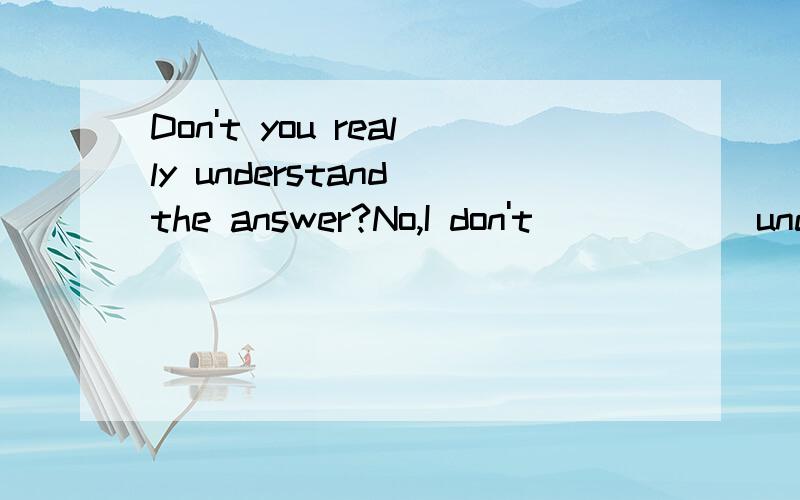Don't you really understand the answer?No,I don't _____ understand the answer.A quite B very Cso D too
来源:学生作业帮助网 编辑:作业帮 时间:2024/11/18 22:57:09

Don't you really understand the answer?No,I don't _____ understand the answer.A quite B very Cso D too
Don't you really understand the answer?
No,I don't _____ understand the answer.
A quite B very Cso D too
Don't you really understand the answer?No,I don't _____ understand the answer.A quite B very Cso D too
选A 没什么原因,一般都是这么说的,多读几次,下次自然而然就会选了...
quite
quite的意思是“相当;完全地”,是一个副词,但它很特殊.它不但能修饰动词、形容词、副词、分词,还能修饰名词、介词短语等.
(1)quite修饰形容词、副词等.如:
She is quite right. 她完全正确.
This is quite impossible. 这是完全不可能的.
I know how to use the machine quite well. 我完全知道怎么使用这台机器.
He worked quite hard. 他工作很努力.
(2)quite修饰名词.
①当名词前没有形容词修饰时,quite要放在冠词前.如:
quite a lot 许多 quite a time 很长一段时间
quite an effort 很大努力 quite a while 一段相当长的时间
quite a few 相当多 quite a little 相当多;大量的
②当名词前有形容词修饰时,quite可放在冠词前,也可放在冠词之后,但放在冠词之前较普遍.如:
He is quite a clever boy.(较普遍)
或He is a quite clever boy.他是一个相当聪明的孩子.
(3)quite与not连用,常构成“not quite”结构,表示部分否定,意思是“没有完全……”.如:
She is not quite well.她没有完全康复.
I don't quite understand the problem.我并没有完全理解这道题.
(4)“完全一样”要用exactly the same,不用quite the same.“不完全一样”可说not quite the same.
(5)“完全赞同”可说quite agree,但反义一般不说quite disagree.
辨析:quite 是程度副词,可修饰副词、形容词和动词,跟表示“程度的”词连用时,有“相当”、“非常”的意思.跟“没有程度差距的”词连用时,作“完全”解.如:
I feel quite well. 我觉得身体很不错.
I'm quite tired. 我非常累.
We are not quite ready. 我还没有完全准备好.
very 也是程度副词,意为“很”,“非常”.可用于修饰形容词或副词,但不可直接修饰动词.如:
This factory is very large. 这个工厂很大.
He runs very fast. 他跑得很快.
有时两都可以通用,在份量上 very 比 quite 重.试比较:
His French is quite good. (=not bad) 他的法语很不错.
His French is very good. (=excellent) 他的法语好极了.
注意:quite 和 very 与不定冠词连用时的位置:
He is quite a clever boy.
Hi is a very clever boy.
He is very a clever boy.(误)
quite也可放在a(n) 后面,但只有当名词前有形容词时才可能.如可以说a quite clever boy,而不能说a quite boy.